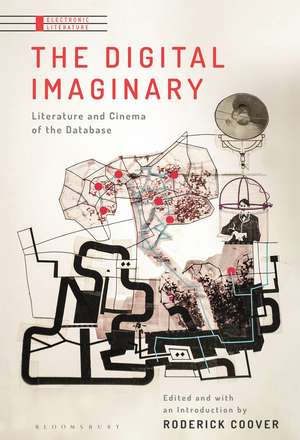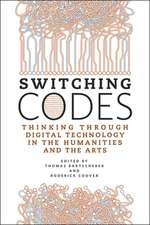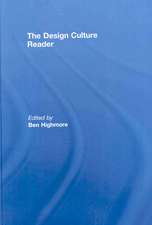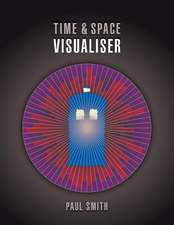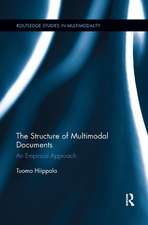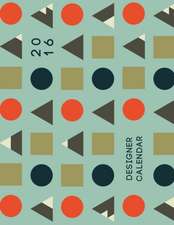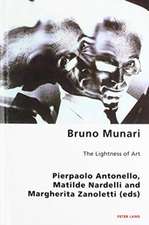The Digital Imaginary: Literature and Cinema of the Database: Electronic Literature
Editat de Roderick Cooveren Limba Engleză Paperback – 19 mai 2021
| Toate formatele și edițiile | Preț | Express |
|---|---|---|
| Paperback (1) | 216.34 lei 6-8 săpt. | |
| Bloomsbury Publishing – 19 mai 2021 | 216.34 lei 6-8 săpt. | |
| Hardback (1) | 568.40 lei 6-8 săpt. | |
| Bloomsbury Publishing – 27 noi 2019 | 568.40 lei 6-8 săpt. |
Preț: 216.34 lei
Preț vechi: 274.20 lei
-21% Nou
Puncte Express: 325
Preț estimativ în valută:
41.40€ • 42.96$ • 34.60£
41.40€ • 42.96$ • 34.60£
Carte tipărită la comandă
Livrare economică 18 martie-01 aprilie
Preluare comenzi: 021 569.72.76
Specificații
ISBN-13: 9781501379406
ISBN-10: 1501379402
Pagini: 208
Ilustrații: 28 bw illus
Dimensiuni: 152 x 229 x 15 mm
Greutate: 0.28 kg
Editura: Bloomsbury Publishing
Colecția Bloomsbury Academic
Seria Electronic Literature
Locul publicării:New York, United States
ISBN-10: 1501379402
Pagini: 208
Ilustrații: 28 bw illus
Dimensiuni: 152 x 229 x 15 mm
Greutate: 0.28 kg
Editura: Bloomsbury Publishing
Colecția Bloomsbury Academic
Seria Electronic Literature
Locul publicării:New York, United States
Caracteristici
Provides insight into the creative process by conducting interviews with the artists themselves, followed by critical commentary by relevant scholars
Notă biografică
Roderick Coover is Professor of Film and Media Arts at Temple University, USA, and author or coauthor of numerous award-winning creative works featured in international arts venues, festivals and public institutions as well as scholarly works spanning fields of the arts, humanities and social sciences.
Cuprins
AcknowledgementsIntroductionThe Digital ImaginaryPart One: DatabaseInterviewsConnections And Coincidences In The End: Death In Seven Colors: A Conversation With David ClarkEmotional Proximity Through Inside The Distance: A Conversation With Sharon DanielCommentariesStuart Moulthrop: Now What: Sharon Daniel And David Clark On The Digital Imaginary. Judith Aston: The Readerly And The Cinematic: Hybrid Reconfigurations ThroughDigital Media Practice. Part Two: ArchiveInterviewsPry As A Cinematic Novel: A Conversation With Samantha GormanThe Generative Archive Of Encyclopedia: A Conversation With Håkan Jonson And Johannes Heldén.CommentariesLisa Swanstrom: The Taxonomy Is Imprecise.Geoffrey C. Bowker: Reading The Endless ArchivePart Three: MultimodalityInterviewsAuthorship In Inanimate Alice and Letter To An Unknown Soldier: A Conversation With Kate PullingerThe Metamorphoses Of Front As A Narrative Told Through Social Media Interface: A Conversation With Donna Leishman.CommentariesAnastasia Salter: Collaborative Voices: Kate Pullinger's Digital Authorial Voice. Mark C. Marino: What Holds Electronic Literature Together? MetacommentariesIllya Szilak: Do Cyborgs Dream Of Iphone Apps? The Body And Storytelling In The Digital Imaginary. Nick Montfort: Computational Literary Practices And Processes And Imagination.AfterwordSteve Tomasula: Haunting The Digital Imaginary. BibliographyIndex
Recenzii
The Digital Imaginary remains a unique text ... Its interviews, commentaries and metacommentaries offer fresh insights on familiar concepts from new media studies ... It is this willingness to bear the unflattering marks of its experiments that makes the book an exhilarating and worthwhile exploration into electronic literature and digital art, one that opens exciting new avenues for academic edited collections.
The Digital Imaginary figures vital, and some of the best, aspects of an emergent world of Electronic Literature by creating just the kind of "discursive community" that its collection of interviews and essays - recursively, self-reflexively - celebrates. Artists who make meaning from computational media and new forms, from multimodality, from digitally-enabled collaboration, and from the transactional choices of their readers are placed in explicit, exploratory dialog with a number of these very readers. A further, generative layer of metacommentary from two widely differing perspectives adds voiceover - from visceral theory (Szilak) and code-level computation (Montfort) - to what is, in particular, an entanglement of cinematic, literary, and computational world-lines. And the whole is haunted by the cosmologically distancing vision of Steve Tomasula, a maker in these multimodal forms for whom the digital imaginary scales, ethically, beyond the horizons of received human culture and technology.
Digitality has erupted the ambit of narratives with which we invent and interpret our being in the world, as well as the forms in which these narratives are expressed and experienced. The Digital Imaginary is an invaluable and elucidative analysis of the current 'state of this art' by authors and artists who are thinking and working at its leading edge. Its penetrating case studies and conversations map best current practices and beguiling future possibilities.
The Digital Imaginary figures vital, and some of the best, aspects of an emergent world of Electronic Literature by creating just the kind of "discursive community" that its collection of interviews and essays - recursively, self-reflexively - celebrates. Artists who make meaning from computational media and new forms, from multimodality, from digitally-enabled collaboration, and from the transactional choices of their readers are placed in explicit, exploratory dialog with a number of these very readers. A further, generative layer of metacommentary from two widely differing perspectives adds voiceover - from visceral theory (Szilak) and code-level computation (Montfort) - to what is, in particular, an entanglement of cinematic, literary, and computational world-lines. And the whole is haunted by the cosmologically distancing vision of Steve Tomasula, a maker in these multimodal forms for whom the digital imaginary scales, ethically, beyond the horizons of received human culture and technology.
Digitality has erupted the ambit of narratives with which we invent and interpret our being in the world, as well as the forms in which these narratives are expressed and experienced. The Digital Imaginary is an invaluable and elucidative analysis of the current 'state of this art' by authors and artists who are thinking and working at its leading edge. Its penetrating case studies and conversations map best current practices and beguiling future possibilities.
